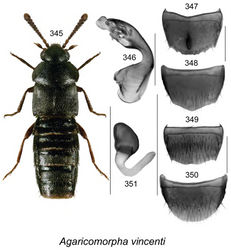Agaricomorpha vincenti
| Notice: | This page is derived from the original publication listed below, whose author(s) should always be credited. Further contributors may edit and improve the content of this page and, consequently, need to be credited as well (see page history). Any assessment of factual correctness requires a careful review of the original article as well as of subsequent contributions.
If you are uncertain whether your planned contribution is correct or not, we suggest that you use the associated discussion page instead of editing the page directly. This page should be cited as follows (rationale):
Citation formats to copy and paste
BibTeX: @article{Webster2016ZooKeys, RIS/ Endnote: TY - JOUR Wikipedia/ Citizendium: <ref name="Webster2016ZooKeys">{{Citation See also the citation download page at the journal. |
Ordo: Coleoptera
Familia: Staphylinidae
Genus: Agaricomorpha
Name
Agaricomorpha vincenti Klimaszewski & Webster sp. n. – Wikispecies link – ZooBank link – Pensoft Profile
Holotype (male)
Canada, New Brunswick, Carleton Co., Jackson Falls, “Bell Forest”, 46.2200°N, 67.7231°W, 7–21.VI.2012, C. Alderson & V. Webster, coll. // Rich Appalachian hardwood forest, Lindgren funnel trap in canopy of Fagus grandifolia (LFC). Paratypes: Canada, New Brunswick, Carleton Co., Jackson Falls, “Bell Forest”, 46.2200°N, 67.7231°W, 1–8.VI.2009, R. Webster & M.-A. Giguère, coll. // Rich Appalachian hardwood forest with some conifers, Lindgren funnel trap (1 ♀, LFC); same data except 8–23.V.2012, C. Alderson & V. Webster // Lindgren funnel trap in canopy of Acer saccharum (1 ♀, RWC); same data except 17–31.VII.2012 // Lindgren funnel trap in canopy of Juglans cinerea (1 ♂, LFC). Northumberland Co., ca. 1.5 km NW of Sevogle, 47.0939°N, 65.8387°W, 8–22.VII.2013, C. Alderson & V. Webster // Populus tremuloides stand with a few conifers, Lindgren funnel trap 1 m high under Populus tremuloides (1 ♀, RWC). Restigouche Co., Dionne Brook P.N.A., 47.9030°N, 68.3503°W, 30.V-15.VI.2011, M. Roy & V. Webster // Old-growth northern hardwood forest, Lindgren funnel trap (1 ♀, RWC). Sunbury Co., Gilbert Island, 45.8770°N, 66.2954°W, 23.V-6.VI.2013, C. Alderson, C. Hughes, & V. Webster // hardwood forest, Lindgren funnel trap in canopy of Fraxinus pennsylvanica (1 ♂, RWC).
Etymology
This species is named in honor of Vincent Webster who collected a number of specimens of this species and many other species reported in this and other papers.
Description
Body small, compact, and narrowly oval in outline; length 1.7–1.9 mm; body, antennae, and legs uniformly black (Fig. 345); forebody with strong microsculpture, that on elytra and abdomen coarse, scale-like, punctation coarse, sparse, and flatly impressed, pubescence sparse and approximately evenly distributed on forebody; head transverse, eyes large, postocular area reduced, pubescence directed posteriad and obliquely mesad; antennae incrassate, basal three antennomeres elongate, IV subquadrate, V–X increasingly broadening apically, XI oval and elongate; maxillary palpi with four articles, penultimate article expanded apically, and apical article acicular; pronotum strongly transverse, distinctly broader than elytra, base strongly sinuate, lateral edges abruptly converging apicad, disk with most pubescence directed posteriad, some at base directed laterad; elytra at suture as long as pronotum, pubescence directed straight posteriad; abdomen gradually but weakly tapering apically, tergites II and III strongly impressed basally, and with elevated punctures. Male. Median lobe of aedeagus with bulbus moderately large in lateral view, tubus U-shaped, narrow with broad and swollen apical part, flagellum long and thin (Fig. 346); tergite VIII transverse, apical margin arcuate, unevenly crenulate (Fig. 347); apical margin of sternite VIII obtusely angulate, broadly rounded medially (Fig. 348). Female. Tergite VIII transverse, sinuate apically with small median emargination (Fig. 349); sternite VIII transverse, apical margin subsemicircularly rounded (Fig. 350); spermatheca small, with capsule asymmetrical, narrowing toward apex, stem short, U-shaped (Fig. 351).
Distribution
Known only from NB, Canada.
Natural history
Specimens of Agaricomorpha vincenti were captured in Lindgren funnel traps in a rich Appalachian hardwood forest, a Populus tremuloides stand with a few conifers, an old-growth northern hardwood forest, and a hardwood forest on an island in a river. Nothing is known about the specific habitat requirements of this species. Adults were collected during May, June, and July in NB.
Comments
This species may be readily distinguished from Agaricomorpha websteri Klimaszewski & Brunke by the differently shaped pronotum, which is distinctly broader than the elytra, by its uniformly black body, and by the shape of the median lobe of the aedeagus, male tergite VIII, and spermatheca (Figs 345, 346, 347, 351).(See Brunke et al. 2012[1] for details on Agaricomorpha websteri).
Original Description
- Webster, R; Klimaszewski, J; Bourdon, C; Sweeney, J; Hughes, C; Labrecque, M; 2016: Further contributions to the Aleocharinae (Coleoptera, Staphylinidae) fauna of New Brunswick and Canada including descriptions of 27 new species ZooKeys, (573): 85-216. doi
Images
|
Other References
- ↑ Brunke A, Klimaszewski J, Dorval J, Bourdon C, Paiero S, Marshall S (2012) New species and distributional records of Aleocharinae (Coleoptera, Staphylinidae) from Ontario, Canada, with a checklist of recorded species. ZooKeys 186: 119–206. doi: 10.3897/zookeys.186.2947
